DR Congo election 2023: What you need to know
- Published
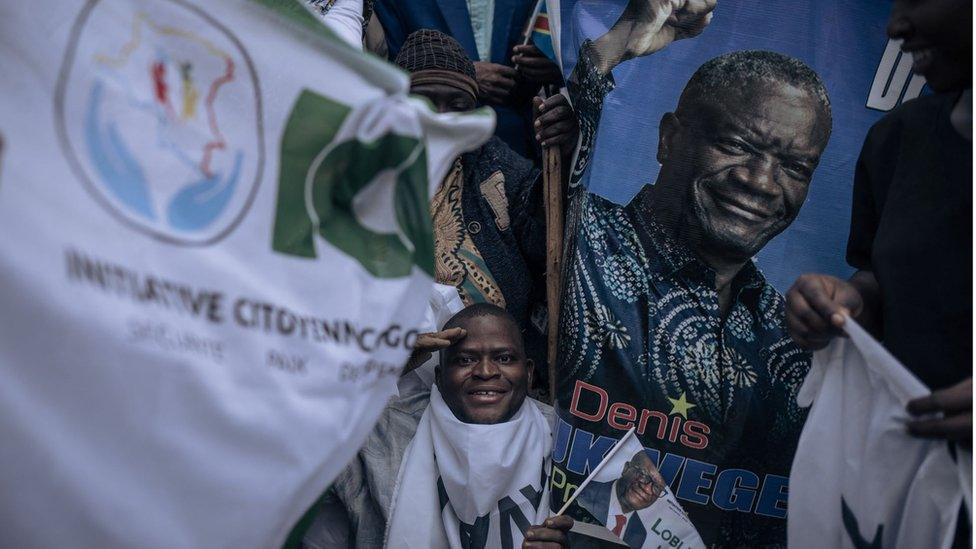
Denis Mukwege is one of the 22 presidential candidates
Nearly 40 million Congolese voters go to the polls for the next presidential election on 20 December with President Félix Tshisekedi seeking a second, and final, five-year term in office.
The Democratic Republic of Congo is the largest country in sub-Saharan Africa. Spanning an area the size of Western Europe with an estimated population of more than 100 million people, the country is rich in natural resources.
Despite some calls for the election to be postponed, the head of the electoral commission is confident that everything will be ready in time.
Why does this election matter?
It holds 70% of the world's reserves of coltan, a highly prized mineral used to make mobile phones, plus 30% of the world's diamonds and large quantities of cobalt, copper and bauxite.
Although its vast mineral wealth and huge population represent huge economic assets, life in DR Congo is not improving for most people for a number of reasons, such as conflict, corruption and many decades of poor governance dating back to the colonial era.
Eastern DR Congo, where most of the mineral wealth lies, has been ravaged by conflict for three decades.
It is impossible to know how many lives have been lost - a 2008 study by the International Rescue Committee estimated that about 5.4 million people may have died, mostly from hunger and disease, making it the deadliest since World War Two. However, other studies have cast doubt on the accuracy of this figure.
After years of political instability and coups, DR Congo is organising elections for the first time since the peaceful transfer of power between former President Joseph Kabila and Mr Tshisekedi in 2019.
Who are the candidates?
Following the withdrawal of six candidates, including former Prime Minister Augustin Matata Ponyo, there are now 20 presidential candidates, including Mr Tshisekedi.
His main challengers are:
Martin Fayulu, the man believed by many observers to have been the rightful winner of the 2018 presidential election, even though he came second according to official results.
Moïse Katumbi, a wealthy businessman and former governor of Katanga province, as well as the owner of the TP Mazembe football team
Dr Denis Mukwege, the winner of the 2018 Nobel Peace Prize for his work with rape survivors.
Four of the candidates who have withdrawn have thrown their support behind Mr Katumbi and his "Together for the Republic" party, while two, Patrice Majondo Mwamba and Joëlle Bile, are now backing President Tshisekedi.
Still in the running are another former Prime Minister, Adolphe Muzito, MP Delly Sesanga, activist Floribert Anzuluni and Constant Mutamba.
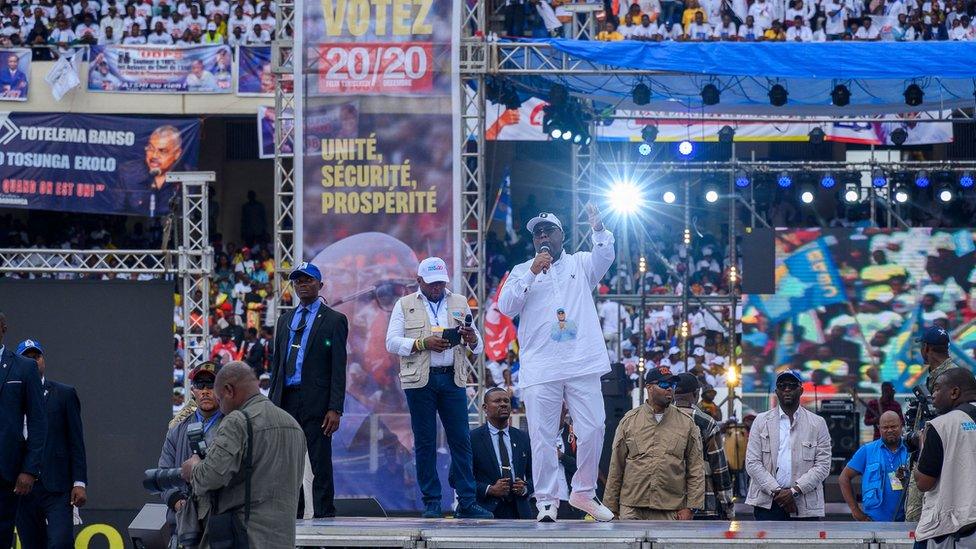
President Félix Tshisekedi launched his campaign in Kinshasa's main football stadium
Ms Bile's withdrawal leaves just one female candidate - Marie-Josée Ifoku Mputa, who also ran in the 2018 election.
Running for election is not cheap.
All candidates had to pay 160m Congolese francs to participate ($60,000; £47,000) in non-refundable application fees.
However, this is less than the previous election, when the fee was $100,000.
The voting system
Whichever candidate gains the most votes in the first round becomes the next president, whether or not they have more than 50%. So there is no second round run-off.
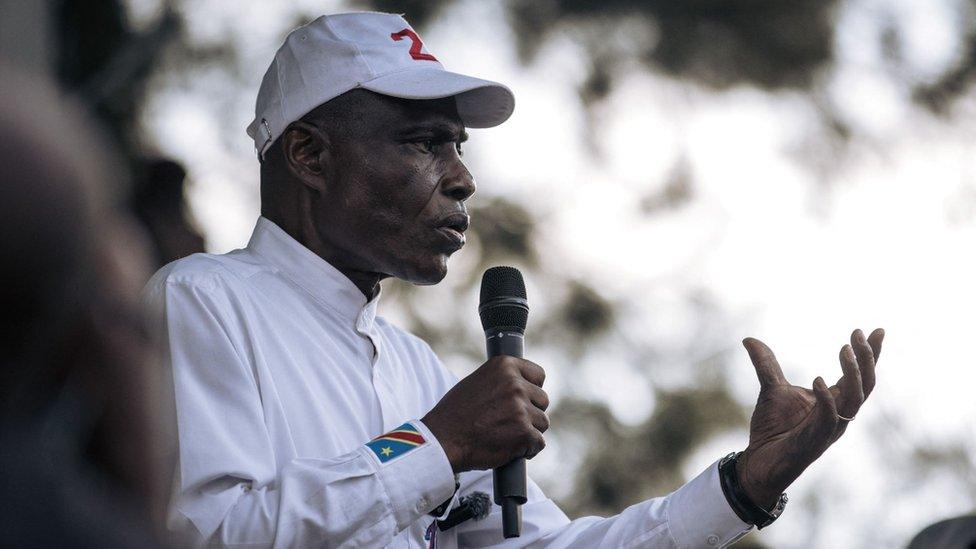
Martin Fayulu's supporters believe he was robbed of victory in 2018
The winner is then in post for a five-year term, renewable once only.
Voting takes place 90 days before the expiry of the current president's term.
This year, the presidential election will be combined with the election of members of both national and provincial parliaments and local councillors.
What is at stake?
This year's elections take place against a backdrop of conflict in the east, an economic and social crisis and a lack of trust between the government and opposition.
Opposition parties suspect the government of orchestrating electoral fraud, accusing it of restricting freedoms and democratic space. The government rejects these accusations.
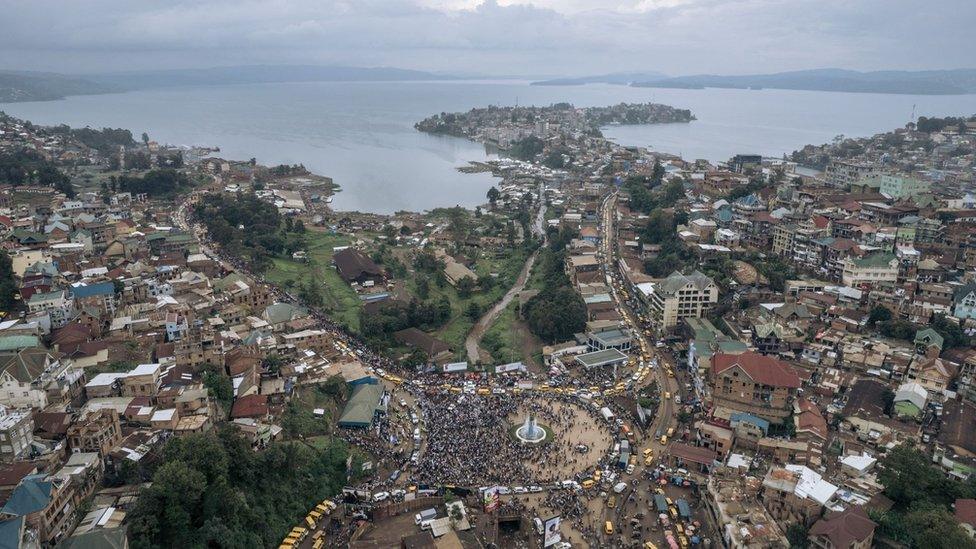
Eastern DR Congo is home to beautiful mountains and lakes, as well as huge mineral wealth. This is the view from the town of Bukavu
The many assurances given by the Independent National Electoral Commission (Ceni) have failed to alleviate the opposition's concerns.
The bishops of DR Congo's influential Catholic Church, and the leaders of the Church of Christ in Congo (ECC) recently said they shared the opposition's worries.
There is also a cost-of-living crisis. The effects of the Covid-19 pandemic and the war in Ukraine are still hitting ordinary Congolese people in the pocket.
Inflation has reduced the purchasing power of ordinary citizens, who now have to pay more for their basic necessities, like food.
The value of the Congolese franc has fallen by 15-20% against the US dollar since the start of the year, according to official figures.
Two-thirds of DR Congo's population now live below the poverty line, earning $2.15 a day or less.
President Tshisekedi has launched a number of initiatives to try to tackle these issues including free primary school education and free healthcare for women giving birth at public medical facilities.
However, opinion remains divided over how effective these measures have been across the country.
Conflict in the east
The government has imposed a state of siege across the provinces of North Kivu and Ituri for almost a year but conflict continues to rage.
Rebel groups such as the M23, the Allied Democratic Forces (ADF) and Codeco continue to carry out attacks against both ordinary people and military targets.
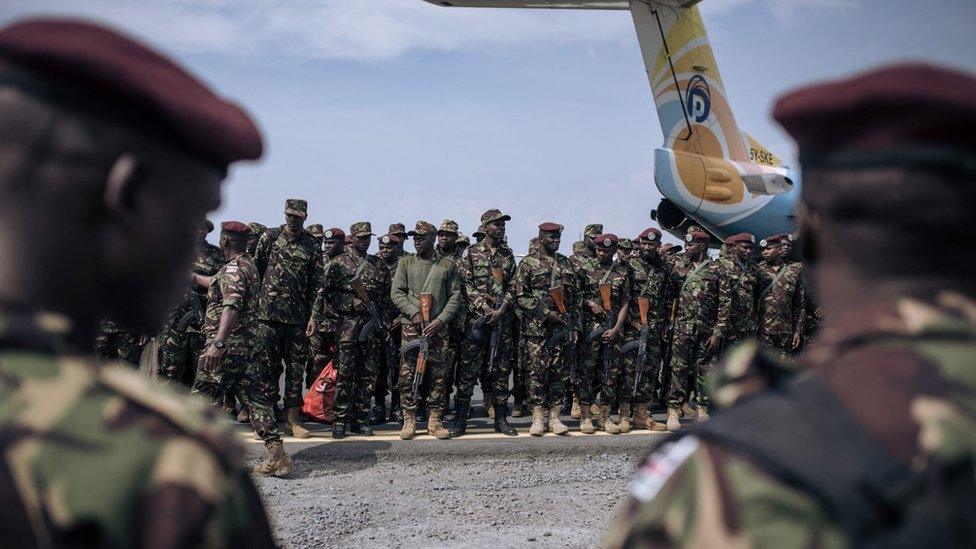
Kenyan soldiers were sent to DR Congo last year to help tackle rebel groups but the government has ordered them to leave
As a result of the violence, DR Congo has among the highest number of internally displaced people in the world. Almost 6.9 million people are thought to have been forced to flee their homes since March 2022. The UN estimates that 28% of the population has been forcibly displaced in North Kivu and 39% in Ituri respectively.
Other hotspots have emerged as a result of inter-community conflicts, notably in the province of Tshopo, in the north-east, and in Maï-Ndombe, in the south-west of the country.
Insecurity is likely to disrupt voting in some parts of the country. In November, the electoral commission said it had lost around 30 agents to drowning and attacks by armed groups during the registration of voters.
The Congolese government recently demanded the departure of troops from East African countries by the end of the year, accusing them of failing to stop attacks from armed groups less than a year after their deployment.
Watching the vote
The electoral commission is supposed to be an autonomous, permanent and neutral body governed by public law, and endowed with legal power.
Composed of 15 members, its mission is to "guarantee free and democratic elections".
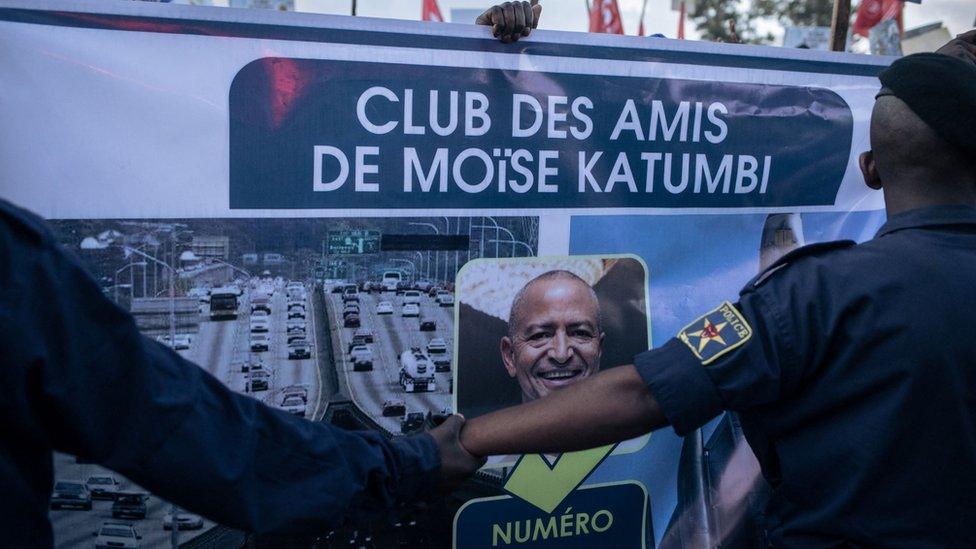
Moise Katumbi is known as the owner of the massive TP Mazembe football team
However, it has come under fire from critics who accuse its president, Denis Kadima, of being too close to the government. They fear the fact he comes from the same ethnic group as the president could affect the integrity of the result.
For his part, Mr Kadima has repeatedly stated that his institution is committed to transparent elections that respect democratic principles.
The European Union observer mission has pulled out of the election, after failing to reach an agreement with the Congolese government over the importation of communication devices they needed to use. They will be deploying eight experts but only in the capital, Kinshasa.
In the past, the African Union, religious denominations and civil society organisations have deployed observers to closely monitor voting.
When will we get the results?
According to the electoral calendar, the provisional results are expected on 31 December.
If the results are ready before that, they could be released sooner. But in previous elections, Ceni has not announced any partial results - it has waited until all the votes have been counted across this vast country before declaring the winner.
The next president will be sworn into office on 20 January.
Additional reporting by Emery Mukumeno in Kinshasa